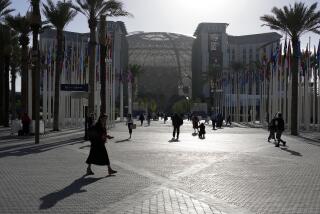Few Expect Accord on OPEC Issues : Meeting Not Likely to Solve Price and Production Problems
- Share via
The Organization of Petroleum Exporting Countries’ year-end meeting gets under way in Geneva today, but although the cartel is struggling with eroding demand and intensifying competition from rival producers, few OPEC watchers believe it will reach any new agreements on how to prop up declining oil prices.
The OPEC nations “will leave without addressing the key issue, which is production control,” predicted Constantine Fliakos, an oil analyst with Merrill Lynch in New York.
The deep divisions within the 13-nation group were evidenced Friday when a six-member preparatory committee met in Geneva for a mere 90 minutes and broke up without reaching agreement on recommendations for the full meeting.
“We left everything for the conference,” Mana Said Oteiba, committee chairman and oil minister of the United Arab Emirates, was quoted by the Associated Press as saying.
Prices Firm in November
According to analysts, the cartel is now producing 18 million barrels of oil a day, about 2 million barrels over its self-imposed ceiling.
Crude oil prices held firm through November despite the high production because oil companies are busy building up their unusually low stocks for winter. Now, with supplies up slightly and prices softening, “only a very cold winter”--with its heightened demand for heating oil--”can save OPEC,” said one New York analyst.
Most analysts believe that the real showdown will come in the spring. If worldwide demand for OPEC oil falls back to 15 million barrels a day, as many analysts believe it will, “they are going to have 2 million or 3 million extra barrels to deal with and that will be the pressure point for them,” said Richard Adkerson, director of oil field services for Arthur Anderson & Co. in Houston.
To sell extra production, most OPEC nations already have deviated from the cartel’s official prices by offering discounts to buyers. Saudi Arabia is selling about 2 million barrels a day--or almost half its production--through so-called net-back deals, in which the price of oil is linked to the end products into which it is transformed, especially gasoline.
Despite this widespread market-based pricing, few analysts expect OPEC to adopt a plan such as that proposed by Venezuela, which would officially tie the price of OPEC crude oil to a “market basket” of non-OPEC crudes such as the North Sea crudes. Prices for non-OPEC products are unfettered by cartel restrictions and thus respond more readily to market demand.
Analysts said OPEC might be reluctant to abandon its official pricing system because that would amount to an official admission that it can no longer dictate prices to the market.
Fliakos noted that it is “enormously difficult” to establish uniform prices based on the net-back deals, for example, because there are too many variables in such pricing: the products that are made, the efficiency of the refinery where the crude will be processed, transportation costs and other factors. Some OPEC countries don’t use net-back pricing.
“It’s a question of everyone thinking their system is the best,” he said.
Whether or not the cartel acknowledges the turnabout in OPEC pricing, certain oil ministers have acknowledged it. Asked if he favored a revision of the OPEC pricing structure, Saudi Oil Minister Ahmed Zaki Yamani responded: “There is already a linkage.”
Market Sets Prices
Analysts said it is clear that OPEC no longer is capable of setting prices. Today about 80% of the oil is sold at market-determined prices, compared to only about 5% of the oil in 1979.
Oil prices on the futures market have dropped by $2 a barrel during the last two weeks, indicating a wide expectation that oil prices will begin their downward tumble after Jan. 1. Some analysts attribute part of that decline to warnings such as that offered this week by Nigerian Oil Minister Tam David-West, who said oil prices could drop by $8 a barrel to $20 “in the near future.”
“I think the real question is, Why is OPEC talking the market down?” said Peter Beutel, an analyst with Rudolf Wolff Futures in New York. He said he believed that OPEC was trying to restrain additional worldwide production with talk of lower prices.
“It’s widely believed that North Sea production becomes uneconomic at $15 to $20 a barrel,” whereas OPEC nations can make money at those levels, he said. “I think they are trying to discourage North Sea production,” he said.
The most significant development in OPEC production in recent weeks has been the increased production by Saudi Arabia, which has abandoned its role as swing producer--the cartel member that tries to maintain prices by moderating production. It has increased its production to fill its quota, about 4.3 million barrels a day, from the 2.2 million barrels it was producing this summer.
That development makes “Iran the wild card, the new swing producer,” said Beutel. Iran, which is engaged in a protracted war with Iraq, frequently suffers supply disruptions when Iraq bombs its chief export terminal at Kharg Island.
There’s even some talk of increasing OPEC production. The United Arab Emirates says it wants to increase its 950,000-barrel-a-day quota, and Qatar has said it likewise wants an increase in its 280,000-barrel-a-day quota.
Despite that, one analyst said that OPEC will probably act informally to curb production. Member nations are reluctant to “put anything down on paper” regarding new production allocations because that means “someone has to make a sacrifice. But they know what they have to do,” the analyst said.
More to Read
Sign up for Essential California
The most important California stories and recommendations in your inbox every morning.
You may occasionally receive promotional content from the Los Angeles Times.













